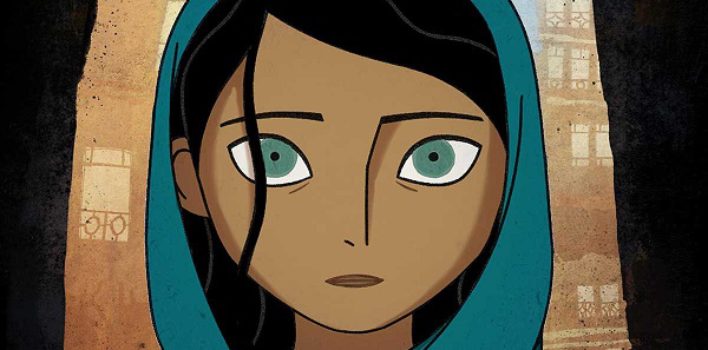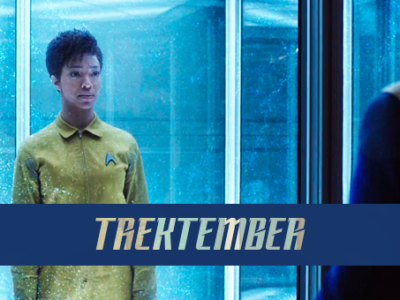Review| The Breadwinner
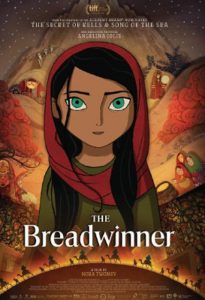 While Gal Gadot’s Wonder Woman remains my heroine of the year, The Breadwinner’s Parvana is a steadfast and intrepid contender.
While Gal Gadot’s Wonder Woman remains my heroine of the year, The Breadwinner’s Parvana is a steadfast and intrepid contender.
Cartoon Saloon has now officially become my favorite animation house. As of now, the Ireland-based studio has put out a handful of short films and three features. The unique quality and heart of their work is unmatched. If you have not seen their stunning films The Secret of the Kells and Song of the Sea, drop everything you’re doing and remedy that, and then go see The Breadwinner.
Set in Afghanistan’s capital city of Kabul, The Breadwinner is the story of one girl’s faithful fight to keep her family together—defying the Taliban regime that oppresses them.
Parvana is a rarity in her society. Her father (once a professor) educates and protects her. Like most Middle Eastern and Oriental cultures, theirs is a storytelling culture. Her father, Nurullah, teaches her their history—times of peace and openness she has never known. He also imparts folklore and myth that weaves enchanting tapestries in both her imagination and ours.
Parvana’s presence instantly recalled to me one of National Geographic’s most famous photographs, Sharbat Gula aka: The Afghan Girl, photographed in 1984 by journalist Steve McCurry. The intensity of the green eyes, the challenging glare, even the choice to have Parvana wrapped in the same red and green colors evokes that unforgettable image of Sharbat.
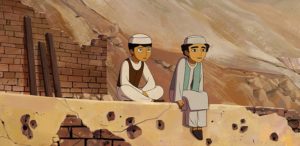 When Taliban thugs harass Nurullah and Parvana in the marketplace, it later leads to Nurullah’s arrest. With their father gone, and the only other male in the house still an infant, Parvana and her family are left in a desperate situation. Women are unable to leave the house without a male chaperone. If they cannot leave, they cannot bring back food and water, and they cannot find out what has become of their father. Parvana makes the bold move of cutting off her hair and dressing as a boy. She becomes their breadwinner.
When Taliban thugs harass Nurullah and Parvana in the marketplace, it later leads to Nurullah’s arrest. With their father gone, and the only other male in the house still an infant, Parvana and her family are left in a desperate situation. Women are unable to leave the house without a male chaperone. If they cannot leave, they cannot bring back food and water, and they cannot find out what has become of their father. Parvana makes the bold move of cutting off her hair and dressing as a boy. She becomes their breadwinner.
Parvana soon discovers she is not alone in her desperation. An old friend, Shauzia, appears before her also disguised as a boy for similar reasons. Shauzia is sassy and street-smart, and quickly lures Parvana into her own methods of making money with odd jobs. The two of them wander the streets and outskirts of Kabul as partners in crime, delighting in both the freedoms and unexpected burdens of walking through life as the opposite sex.
War-torn Afghanistan appears post-apocalyptic and otherworldly. This is something that ultimately makes you pause, remembering it is actually what real life looks like for so many people. The Breadwinner does a remarkable job of knowing when to balance things for the audience. Its subject matter is as coarse and cruel as the reality it depicts, but there is also an essence of rich culture and wonder as seen through the eyes of a child. A friend of mine remarked that the film manages to be enchanting and hopeful without over-sanitizing the reality of its world.
Alongside Parvana’s daily life, is a deliciously immersive folktale that she shares with her little brother, older sister, and Shauzia. She tells the story of Sulayman, the boy who would save his village from the evil elephant king that stole the seeds for their annual harvest. Sulayman encounters interesting characters and objects on his mission, including a mysterious red cloud of doom that follows him mercilessly from the start.
When Parvana first takes on her disguise, we learn from her mother that she resembles her brother, Sulayman, who had been killed some time ago. Hence, why she chose the special name for the protagonist in her tale. The scenes of Parvana’s story are animated gloriously in a very two-dimensional, cutout style, reminiscent of Persian/Oriental ceramics and tapestries. They bring bursts of jewel-toned color into Parvana’s otherwise gray and dusty world.
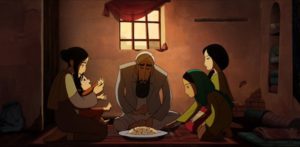 Some people have remarked that, if this film is about the power of women and girls, then why was the protagonist in Parvana’s tale a boy? I believe it is for a couple of reasons. One, to honor her brother’s memory, and two, to stress their equality. Parvana’s story gave power to the boy, and the story of the boy likewise empowered Parvana on her own quest to make money and bring her father home. The message here is not that a girl needs to be like a boy to succeed or to survive. When Parvana essentially becomes Sulayman, she proves that a daughter’s worth is equal to a son’s. I do not think this important theme would have come across as profoundly had her tale featured a girl. As Parvana and Sulayman’s stories intertwine, we see two equally brave and self-sacrificing heroes side-by-side. The point of The Breadwinner is that the breadwinner truly can be anyone.
Some people have remarked that, if this film is about the power of women and girls, then why was the protagonist in Parvana’s tale a boy? I believe it is for a couple of reasons. One, to honor her brother’s memory, and two, to stress their equality. Parvana’s story gave power to the boy, and the story of the boy likewise empowered Parvana on her own quest to make money and bring her father home. The message here is not that a girl needs to be like a boy to succeed or to survive. When Parvana essentially becomes Sulayman, she proves that a daughter’s worth is equal to a son’s. I do not think this important theme would have come across as profoundly had her tale featured a girl. As Parvana and Sulayman’s stories intertwine, we see two equally brave and self-sacrificing heroes side-by-side. The point of The Breadwinner is that the breadwinner truly can be anyone.
That being said, this film provides girl power in a variety of ways. Not only are we inspired by the women of the story, but it was also written and directed by women (Nora Twomey and Anita Doron) and based on a novel written by Deborah Ellis.
It is important to also note that alongside the brutality of the Taliban soldiers and stringent authority figures, we experience examples of good and loving men. Men like Parvana’s father and the man she later meets at the market, Razaq. I truly appreciated the balance and empathy given to all the characters. Life for boys isn’t really all that to be desired either, as most are destined for grueling hard work, or to die for the extremist crusade of the Taliban. Even later on when we see the bullying, young Taliban soldier that sent Parvana’s father to jail, I find myself feeling sorry for him. As he jumps into the back of a beat up truck toward an unknown fate, fighting a senseless war, we catch a glimpse of how afraid he really is. The fear of the Taliban is not reserved solely for civilians, but also for those they wish to use as living pawns in their game.
I highly recommend this work of art for both children and adults, but I would advise it for children 8 and up as some of the content does require a certain level of worldliness and maturity.
“Raise your words, not your voice.
It is rain that grows flowers, not thunder.” – Rumi
 As a long-time Rumi enthusiast, I want to conclude by expressing how much the use of the quote at the end filled me with joy. Here Rumi’s words tie Parvana’s story together with a tender call to action, contrasting beautifully against the example of the violence and force used by the thundering Taliban.
As a long-time Rumi enthusiast, I want to conclude by expressing how much the use of the quote at the end filled me with joy. Here Rumi’s words tie Parvana’s story together with a tender call to action, contrasting beautifully against the example of the violence and force used by the thundering Taliban.
The Breadwinner is a magnificent reminder of the power of stories. Art imitates life, and life is moved by art. As Nurullah tells his beloved daughter in the first moments of the film, “Stories remain in our hearts even after all else is gone…”


